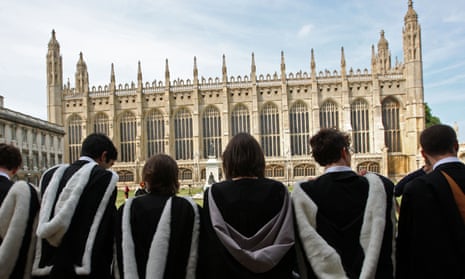Last summer, graduating students at Cambridge who had taken an optional “postcolonial” paper had a discussion with lecturer Dr Priyamvada Gopal about broadening the English curriculum to be more inclusive of literature from the global south. One of the students, Lola Olufemi, women’s officer for the Cambridge University student union, summarised the ideas in an open letter, which was signed by 100 students and sent to the head of the English faculty in June.
But that’s not what Telegraph readers have been told. Instead, with a photo of Lola on the front page, the headline claims: “Student forces Cambridge to drop white authors”.
I consider this wilful misconstruction. The open letter references the marginalisation and misrepresentation of writers from the global south within the “canon”, explicitly noting: “This is not a call for the exclusion of white men from reading lists, needless to say: it is a call to re-centre the lives of other marginalised writers who have been silenced by the canon.”
As Gopal has confirmed, there has been no substantial change yet in curriculum material, and so the idea that “English literature professors will be forced to replace white authors with black writers” is fictional. At present, the only concrete step taken towards decolonising the curriculum has been the open letter. However, clarification of the true details of Lola’s involvement is fruitless without addressing the culture behind the media coverage of the activism of students of colour.
It is a culture that makes sacrificial lambs of individual students and demands that they surrender themselves for public dissection. It has happened to me. I had my own experiences with wilful misconstruction and harassment following reports written about me, but it is undeniable that women of colour bear the greatest brunt of vitriol. The racialised misogyny activists receive when they are viewed as disruptive is evidenced in the recent smear campaigns against Esme Allman and Munroe Bergdorf. By coincidence, the Mail Online has printed a correction today apologising for the “distress and embarrassment caused to Ms Allman”. However, it didn’t stop the site repeating the idea that academics are being “forced” to decolonise the course following student “demands”, as well as trawling through the internet to find an image of Lola with Diane Abbott. Why associate Abbott with this story? Because she regularly faces similar public trials for her progressive politics. There is a disturbing obsession in some media outlets with selecting individual black activists and conducting public beatings of us, jeopardising our privacy and safety and that of our families.
The Telegraph chose to use a sultry image of Lola on the front page accompanied by an inflammatory caption. This choice taps into the age-old media stereotype of black women as aggressive and irrational, catalysing the onslaught of racialised misogyny against her. By making Lola the solitary figure behind the decolonisation movement at Cambridge, the coverage ignores the fact that heavy support for diversifying curriculums has come from white students. Instead, a black v white dichotomy has been presented, creating division – the very division black student activists are accused of creating when they hold white supremacy to account. Is is a coincidence that the media has decided to pick up on this story now, given that Lola, in her role as women’s officer, has just championed the launch of Breaking the silence, the “most comprehensive response to sexual misconduct in the institution’s history”? Her labour in this has been sidelined, so she can be deemed solely responsible for decolonisation initiatives that are in fact supported and led by academics and students from across the university.
Decolonisation of education remains important and relevant. Oxford University’s recent move to include a history paper on non-European history was one small step in the right direction. In my own department, sociology, initiatives to diversify curricula led by Dr Mónica Moreno Figueroa and others were met with praise and support from the student body. The Black and Minority Ethnic Campaign, which I lead, will be continuing to endorse decolonisation initiatives, while I will be commissioning a report into the educational experiences of students of colour to address the current ethnic attainment gap – based on 2016 university exam statistics, while 83% of white students at Cambridge achieve first or upper second class results, just 68% of black students do. It is evident that diverse, inclusive and relatable curricula could be one step towards bridging this educational gap, and also attract diverse students to the university.
Diversity of thought is vital if universities wish to retain intellectual integrity. It is no longer acceptable to present male, European authors as the gold standard of knowledge, and marginalised groups are shaking the academy from all angles. This type of media takedown of student activism is a major barrier to progress and honest discussion. We won’t be stopping, however – the stakes are too high.
